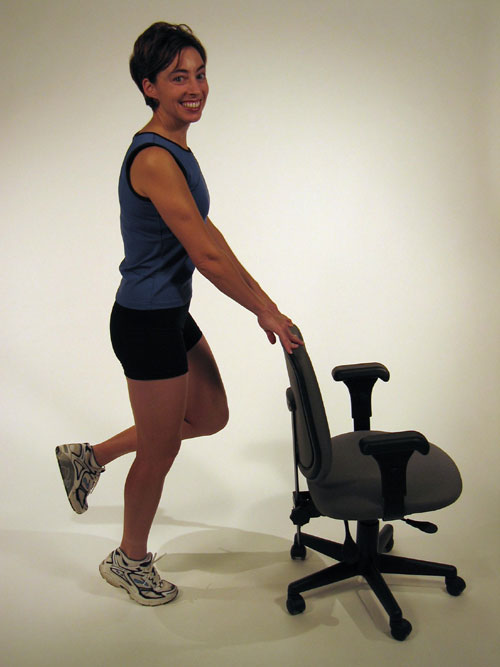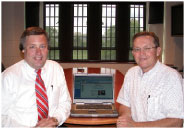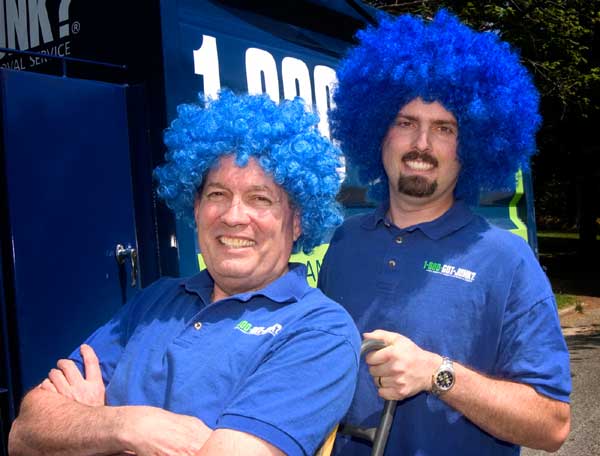
|
|
In the United States, a free public education is a right granted to every child. In Tanzania, however, limited facilities mean that only 20 percent of eligible students attend secondary school.
Seeing this shortage firsthand, former Peace Corps volunteer Charlie Sloan (mechanical engineering '92), who had taught at a government boarding school and a private school in Tanzania, knew something needed to be done. At his father's suggestion, Sloan and three Tanzanian friends began construction of a school on a 15-acre plot in Bagamoyo, a port town on the Indian Ocean, and in January 2001, Nianjema Secondary School opened its doors to 90 students.
|
The original building plan contained only four classrooms, but thanks to efforts spearheaded by Sloan's parents in Vienna, Va., the school received money and supplies from more than 200 donors. As a result of this ongoing benevolence, Nianjema School now has 12 classrooms, two science labs, and two computer labs, and 16 faculty members teach classes in English, math, biology, chemistry, physics, Kiswahili (the local language), history, geography, civics, commerce, bookkeeping, and computer studies to more than 200 students.
As school manager and accountant, Sloan contributes to every aspect of running the school, as well as advising the library and teaching sports. "I'm involved pretty much anywhere money is involved," he admits. "But I also advise the principal about starting new programs for the students and adjusting the way things are run." Those adjustments include plans to expand the school even more. "As I go along," Sloan says, "my dreams get bigger and bigger, more and more possible."
Sloan and other school officials are also making plans to build hostels for the students and a high school and a primary school to increase the area's educational opportunities. They also hope to build a hospital to improve the quality of medical care available to local residents. Currently, medical treatment is limited, and patients often die as a result of negligence, lack of equipment, and reluctance to seek medical help early. "It is very hard work," Sloan says, "but it is satisfying dreaming up the world and then making it happen."
For more information on Nianjema School, visit http://www.TanzaniaEducation.org.
|
 Karen Hiser '88
Karen Hiser '88
|
Most who have to travel because of their jobs will admit that being on the road can be a drag--especially on a healthy lifestyle.
But last year, veteran business traveler Karen Hiser (mathematics '88)--who has, she notes, "faced the same poor-quality hotel gyms and high-calorie business dinners as many other travelers"--came up with a solution.
The Healthy Travel Network, a Web-based clearinghouse for information and products that helps business travelers stay fit, seeks to be the premier provider of fitness merchandise and healthy travel advice, as well as to bring business travelers together with like-minded individuals and vendors. "Although we’re the most obese nation in the world, awareness of the importance of fitness and nutrition is increasing every day," Hiser says. "As with the anti-smoking crusade of the '80s, I believe that through continued education and awareness, we'll become one of the fittest nations in the world."
As a resource for achieving that goal, Hiser's website is right on mark. Say you have trouble sustaining your exercise routine while traveling or don't have room in your suitcase for workout clothes and shoes. Perhaps you think hotel fitness centers are too limited or that you don't really have enough time to exercise when traveling. Or maybe you think that healthy meal choices are difficult when dining out. The Healthy Travel Network has answers.
|
For instance, the company's inaugural product, the Travel Fit Kit, a travel pouch containing resistance exercise bands and a CD of three workout programs, allows travelers to undertake a great workout anywhere.
Addicted to the treadmill or running outdoors? The network features an ever-growing directory of information about hotels' fitness equipment, strength-training equipment, and proximity to running trails.
Additionally, the network offers "Travel Fit Tips"--which are, Hiser says, read by more than 150,000 business travelers worldwide--and a "monthly newsletter that educates members on road-warrior fitness and nutrition."
In keeping with its mission, the network also invites travelers to contribute their ideas for staying fit and healthy on the road, including assessments of hotels, useful fitness travel links, recommended exercises and workout programs, and nutrition tips.
Based on the website's underlying collaborative spirit, we suspect that the Healthy Travel Network is destined to become healthier by the day.
For more information, visit http://www.healthytravelnetwork.com/.
|
| Great minds think alike to confront memory loss |
 David Crews Jr. '83
David Crews Jr. '83
and David Harrison
|
When was the last time you couldn't remember something? Do you remember?
It's no secret that between 50 to 80 percent of adults age 45 to 86 experience varying degrees of memory loss. But in some cases, memory loss is a symptom of a larger problem, such as depression, medication side effects, nutritional deficiencies, or forms of dementia.
In response to those concerned about memory loss or interested in charting their memory processes, licensed clinical neuropsychologist W. David Crews Jr. (biology '83; M.S. psychology '92; Ph.D. psychology '95), an adjunct assistant professor of psychology and owner of Virginia Neuropsychology Associates Inc., collaborated with his former teacher David W. Harrison, a licensed clinical neuropsychologist and Virginia Tech associate professor of psychology, to create CogniCheck.com.
|
An online memory screening that evaluates the severity of adults' memory loss, CogniCheck.com uses a series of three tests that gauges verbal learning, facial memory, and digit recall. "With the educational awareness of Alzheimer’s disease and other memory disorders and with the aging of our society, it was clear that a standardized assessment option was needed," says Harrison.
And CogniCheck offers just that. The online screening cannot replace a doctor's evaluation and diagnosis, but it can provide an easily accessible first step for adults who may have trouble securing the appropriate medical care because of location, income, or availability.
The CogniCheck screening is just one of the pair's many collaborations over the past several years. In addition to co-authoring numerous peer-reviewed manuscripts for clinical neuropsychology journals, Crews and Harrison have worked together on a variety of grant projects, including a free memory screening outreach program that served 1,000 adults in Central Virginia.
In describing Crews' progression from student to colleague and teacher, Harrison says, "This is clearly the best part of my job. Dr. Crews is a marvelous teacher and mentor to undergraduate students and to graduate students at Virginia Tech."
For his part, Crews considers Harrison to be his inspiration. "Dr. Harrison's excitement and enthusiasm for clinical neuropsychology were highly contagious," Crews shares, "which in turn ignited a burning passion in me for the field."
Don't forget to visit CogniCheck online at http://www.cognicheck.com/.
|
| Father-son team's got junk |
As an undergraduate, Jon Nystrom (housing, interior design, and restaurant management '97) recalls that he was "known at Tech for being good at 'dumpster diving' and furnishing apartments with great used furniture and items that had been discarded as junk by others."
These days, that nose for junk continues to be an asset.
Jon, formerly a commercial property manager in Raleigh, N.C., and his father, Wayne Nystrom (industrial engineering '69), a self-described "serial entrepreneur," run a 1-800-GOT-JUNK? franchise in Richmond, Va., and business is booming.
Established by a Vancouver-based university student in 1989, 1-800-GOT-JUNK? has become the largest junk removal service in North America, in part because its operation is orderly and reliable--in other words, the antithesis of junky. Those who want junk removed need only contact the business by calling its toll-free number or using the Internet to schedule an appointment. That's it: the junk doesn't even have to be moved curbside before pickup.
|

Wayne Nystrom '69
and Jon Nystrom '97
|
Moreover, the so-called junk generally goes to good use. "We recycle or re-use up to 50 percent of the 'junk' we remove from homes and businesses," Wayne says, "donating items to charities or taking them to recycle centers and to others who can re-use them. We also do a lot of clean-outs for elderly homeowners moving into retirement homes or downsizing. Last September, we helped many homeowners remove literally tons of debris caused by the extraordinary flooding that occurred in Richmond as a result of Tropical Storm Gaston."
Even Tech President Charles Steger is familiar with the company's distinctive service. "We did a junk removal job for President Steger's sister last year," Wayne says. "Later, at an alumni function, Charlie saw the 1-800-GOT-JUNK? logo on my shirt and commented that his sister was so pleased with our service that she had told him about us, so he recognized our company name."
Great service and name recognition aside, Wayne and Jon agree that "it's particularly rewarding to be building a business as father and son," and the two have obviously found a niche. In their business' inaugural year, they were runner-up as "Rookie of the Year" among more than 60 franchises.
"We have fun at what we do," says Wayne, "wearing our signature blue wigs at trade shows and doing 'waves'--during which we stand by our trucks at a busy intersection and wave at people passing by--and especially when we wear our maroon and orange wigs as part of our guerrilla marketing efforts to both drum up business and support the Hokies at football games."
For more information about 1-800-GOT-JUNK?, go to http://www.1800gotjunk.com/.
|
| Engineer out in the world |
Having spent considerable time in college hiking, camping, tubing, and caving, Lisa Myers Campbell (chemical engineering '81) confesses that her years at Tech cultivated not only her love of travel and adventure, but also her concern for the well-being of the environment--traits that would eventually guide her professional choices.
A climate change strategies principal consultant for URS Corporation and a greenhouse gas verification manager for its subsidiary firm, URS Verification Limited, Campbell initially worked as a process design engineer. But when she joined an environmental firm in 1988, she knew she had stumbled upon her vocation. "Although partly fortuitous," Campbell recalls, "I switched career paths to become an environmental consultant because it allowed me to apply my engineering skills in ways that could make a difference."
And make a difference she has. An elected delegate to the United Nations Framework Convention on Climate Change Conference of the Parties, Campbell and her team work with clients in a variety of industries, government agencies, and trade organizations worldwide, developing standards for reducing greenhouse gas emissions, producing tools to support greenhouse gas emissions reporting, and identifying opportunities to reduce emissions and net global impact of climate change.
Besides affording much professional satisfaction, Campbell's position undoubtedly nurtures her wanderlust, taking her to several European countries, India, Indonesia, Thailand, South Korea, and Kazakhstan. "One of the highlights of my job," she notes, "is meeting people from different cultures around the world. I've had the pleasure of making very good friends with my colleagues and clients in many countries, especially Italy and Indonesia." In 2002, Campbell, along with her husband and their two sons, accepted a two-year stint in England, where she was assigned to build and lead the URS climate change practice in Europe.
Despite all that globetrotting, Campbell, whose father is William Myers (chemistry '51; M.S. '53), is apparently still a Hokie at heart. "My extracurricular activities at Tech are certainly ones that left me with an appreciation for one of the most beautiful regions in the world--the countryside surrounding Blacksburg. And I make that comment having been to some incredible locations worldwide."
To learn more about Campbell's work, visit http://www.urscorp.com/ and http://www.ursverification.com/.
|
|
|
This May, two classmates shared more than the bond of earning master's degrees in civil engineering from Virginia Tech's Northern Virginia Campus. Father and daughter Jeff Breunig '05 and Tamara Breunig Karakis '99, '05, who both work in the field of aviation for different companies in Fairfax, Va., and Washington, D.C., respectively, spent the past few years in the university's part-time program. Karakis describes the experience as "an interesting journey of many night classes together and a friendly competition with grades."
|
|
|
South of the Northern Virginia Campus, four graduates became the Virginia Tech Richmond Center's first master’s in public administration (M.P.A.) class in late April. The M.P.A. program--the center's signature academic program and designed for the working professional--currently enrolls 30 students and is a department of the College of Architecture and Urban Studies' School of Public and International Affairs. Its first class enrolled last fall. Another four students graduated from the center's M.B.A. program in April.
|
|